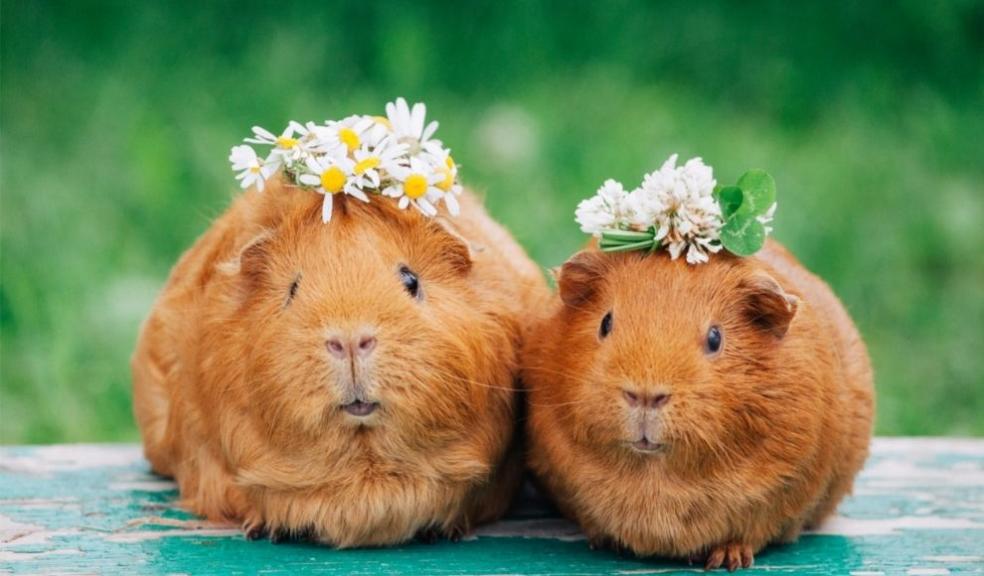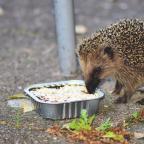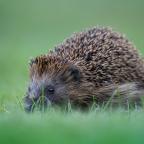
Nine facts you need to know before getting guinea pigs
Guinea pigs can make great pets but it's important to do your research before welcoming any pet into your home. Guinea pigs may be small but they have very specific and complex needs and it's important for prospective owners to know more about their future pets before bringing them home. This is a handy list of nine key facts that you should know before you get guinea pigs.
1. Guinea pigs are active for 20 hours a day
Guinea pigs are very active, they can be awake for up to 20 hours a day - you don't need much beauty sleep when you're a guinea pig! This means that they need lots of space to move about in. This space can be outdoors or indoors but should have a sleeping space, as well as a large exercise run that your guinea pigs can explore, run around, and play in.
Though our pet guinea pigs are not wild animals, they are related to wild guinea pigs native to South America. If the temperature drops below 15 degrees celsius, guinea pigs should be kept indoors. If keeping your guinea pigs indoors is not possible, it's important that they have lots of bedding to make themselves cosy in the winter.
2. Guinea pigs are not agile - they're hiders, not climbers!
While guinea pigs are active, they're not particularly agile little fellows. Your guinea pigs will enjoy tunnels and places to hide, but they're not big climbers. Your guinea pig's environment must be hazard-free to make sure they can't injure themselves by falling off anything.
3. They've gotta get their greens!
Guinea pigs require constant access to grass and/or good quality hay. They don't produce vitamin C and because of this they also need a fresh portion of grass-based guinea pig nuggets and some safe, washed leafy greens daily, such as broccoli and kale. Feeding the correct diet will help keep your guinea's digestive system working nicely and keep their teeth the correct length and shape.
Foods to avoid include grass clippings from a lawnmower as lawnmower clippings can upset their tummies. Additionally, citrus fruits can cause sores to develop on their lips. While root vegetables, such as carrots, are high in sugar and so should be given in moderation. Muesli type foods are also not great, as guinea pigs tend to pick out their favourite pieces (often the unhealthiest!) which doesn't result in a very balanced diet.
Read more: What's a healthy diet for guinea pigs?
4. Guinea pigs are very sociable - they're social butterflies!
In the wild guinea pigs live in groups of between five and ten and so keeping guinea pigs in pairs or small groups is ideal. Good combinations include single-sex pairs or a combination of neutered male with one or more females. The right pairings will help keep your guinea pigs happy.
Making friends with your guinea pig is also important. Careful, considerate handling by an adult from an early age will help guinea pigs be calm and relaxed in human company.
Read more: 8 reasons why you should adopt a rescue guinea pig.
5. Guinea pigs are explorers - and they can see you from most angles!
Before you get guinea pigs, it's important to know that they are explorers. They have brilliant spatial awareness, as well as a great sense of smell and hearing.
Did you know? Because of the shape of their head, they can also see above and behind themselves!
They use these senses to find places to hide, and nooks and crannies to find refuge. To help your guinea pigs feel safe, secure and happy, their home should include small covers and tunnels in their enclosure. This'll mean that your guinea pigs have somewhere to explore and hide.
Read more: What's a suitable environment for guinea pigs?
6. They can be cautious - they are small after all!
Guinea pigs are prey animals in the wild. This means they are naturally cautious and like to hide. Your guinea pigs first instinct will be to freeze when they are greeted with new sights or smells. This is another reason why lots of toys, hiding places and tunnels will help keep guinea pigs happy and sociable whether kept outside or inside.
7. They make 11 individual sounds - they are serious chatterboxes!
The infamous 'wheek-wheek' is one of 11 sounds that guinea pigs make. This 'wheek-wheek' noise is usually a sign of excitement but your guineas will make all sorts of noises for different reasons.Chutting, a purring type of sound means a guinea pig is relaxed, while squeaks often indicate an alarmed or scared guinea pig. Guinea pigs also coo to soothe and comfort each other and will chatter and show their teeth to each other if they are angry or want some space.
8. Guinea pigs are very clever - so don't let them get bored!
Guinea pigs are very intelligent. If you're planning on adopting some, it's important to think about the amount of mental stimulation they'll need. Whether your guinea pigs are inside or outside, a combination of space, toys and things for them to explore will keep them from getting bored.
They will generally enjoy toys that they can gnaw, forage, or hide in. Interesting food (wrapped or hidden in guinea pig safe ways) is also a winner. Wicker or straw objects, tunnels and houses can also be very popular with guinea pigs.
Expert tip: Some toys can be unsuitable for guinea pigs, including plastic toys that can be chewed and swallowed.
9. You can adopt guinea pigs of all ages from the RSPCA
Last year the RSPCA received 600 incidents involving guinea pigs, of all different colours, ages, and needs. If you think an adopted guinea pig might be right for you, why not find out more about the animals at your local RSPCA rehoming centre?
Meet the guinea pigs looking for their new home.
Still curious about whether guinea pigs are right for you?
Find out more about how to look after guinea pigs.
A guest blog by work experience student, Natasha Nunan.







